
FRANET
FRANET is multidisciplinary research network of the European Union Agency for Fundamental Rights (FRA).
FRANET was established in 2011 for the purpose of data collection and research services on fundamental rights issues. Within the FRANET network, the contractors deliver various thematic reports and monthly-bulletins with respect to specific fundamental rights issues in each EU country concerned. The national FRANET teams also contribute to the annual Fundamental Rights Report compiled by FRA. As from 2019 the Institute for Human Rights at Åbo Akademi University and the Faculty of Law at the University of Turku form the national focal point of FRANET. Between 2011-2018 the Institute for Human Rights cooperated with the Finnish League for Human Rights within the FRANET network. Below is a selection of some of the most recent FRA reports which the Finnish FRANET team has contributed to.
Most recent reports
Better legislation – Human rights impact assessments in lawmaking (December 2025)
Lawmakers at the national level are under an obligation to ensure that the adopted legislation respects, protects and fulfils human and fundamental rights, laid down in national constitutions, international human rights treaties, and the EU Charter of Fundamental Rights, when transposing EU legislation. At the EU level, the European Commission requires fundamental rights checks for all legislative proposals. The report examines how human rights impact assessments are built into lawmaking across the EU and its Member States. It draws on extensive desk research, expert consultations as well as field research conducted in 10 EU Member States, including Finland.
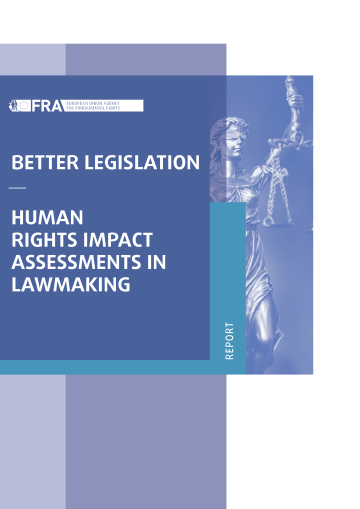
Places of care = places of safety? Violence against persons with disabilities in institutions (November 2025)
The report looks at the breadth and depth of violence and neglect faced by persons with disabilities living in institutions. It highlights the shortcomings by EU Member States in preventing violence and protecting those who are at a higher risk of experiencing it, in line with the UN Convention on the Rights of Persons with Disabilities. Based on research across all EU Member States and FRA observer candidate countries Albania, North Macedonia and Serbia, the report calls for better protection, stronger prevention of violence, and clear accountability.
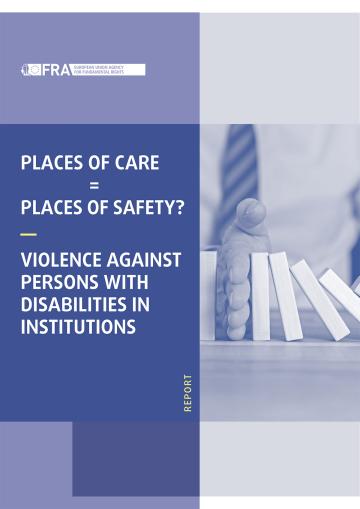
Fundamental Rights Report 2025 (June 2025)
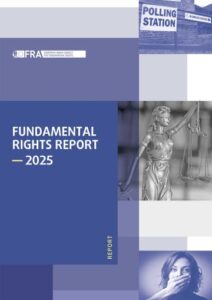
The Fundamental Rights Report 2025 reviews the main developments and challenges of human rights protection in the EU Member States in 2024. The focus chapters in the report cover fundamental rights in elections, gender-based violence, and the national implementation of the EU Charter of Fundamental Rights. The key challenges identified in the report include online threats to fair and safe elections, obstacles to electoral participation, widespread violence against women, increasing levels of discrimination, hate speech and racism, and rights abuses at EU’s borders.

GDPR in practice — Experiences of data protection authorities (June 2024)
The report explores the experiences, challenges and practices of data protection authorities (DPAs) when implementing the General Data Protection Regulation (GDPR). The key areas covered are the independence, supervisory and advisory powers of the DPAs, their cooperation with other regulators at the national level and with other DPAs and the European Data Protection Board at the EU level. The report is based on interviews, conducted by the FRANET network, with representatives of DPAs from all EU Member States. The findings complement the European Commission’s forthcoming (2024) second evaluation of the GDPR.
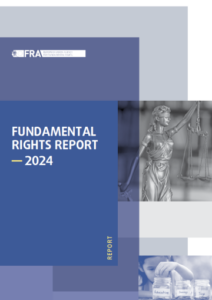
Fundamental Rights Report 2024 (June 2024)
The Fundamental Rights Report 2024 reviews the main developments and challenges of human rights protection in the EU Member States in 2023. It focuses on the most pressing fundamental rights concerns, including rising levels of poverty, persistent threats against democracy, widespread racism and challenges occurring in the context of migration. The report suggests how policymakers and civil society can work in tandem to counter the threat of social exclusion and enable a more equal and fairer society for all.
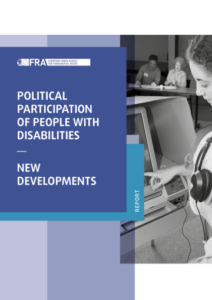
Political participation of people with disabilities — New developments (May 2024)
The report presents developments in 2014–2024 on political participation of people with disabilities in the EU Member States and at EU level. The four main themes covered are legal capacity, accessibility, rights awareness and opportunities for people with disabilities to participate politically. The report also suggests ways to ensure everyone’s rights are respected and identifies promising practices.
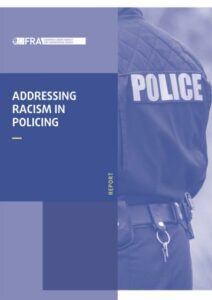
Addressing racism in policing (April 2024)
FRA’s first specific EU-wide study on racism in policing looks comprehensively at the legal frameworks in EU countries and analyses the gaps in policy responses and in effective oversight. It also outlines a variety of practices aiming to combat racism in policing.
European Arrest Warrant proceedings – Room for improvement to guarantee rights in practice (March 2024)

The European Arrest Warrant (EAW) allows EU Member States to implement judicial decisions issued in another Member State. It applies to requests for the purposes of conducting a criminal prosecution or executing a custodial sentence or detention order. FRA’s report examines how national authorities apply selected procedural rights and safeguards guaranteed by EU law in EAW proceedings. It provides insights into the experiences of requested persons as well as lawyers, judges and prosecutors involved in surrender proceedings.
Country studies on Finland:
European Arrest Warrant proceedings – safeguards for requested persons
European Arrest Warrant proceedings – safeguards for requested persons: Perspective of requested persons
Mapping child protection systems in the EU — Update 2023 (January 2024)
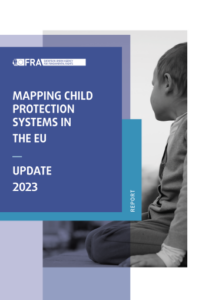
The report gives an overview of the main elements of the child welfare and protection systems in the 27 EU Member States. It looks at national laws and policies, child protection procedures, service providers, human and financial resources, accountability and monitoring systems, and child participation. There is also a dedicated section on migrant children. The report updates FRA’s mapping of child protection systems published in 2015. To complement the 2023 update, FRA published a comparative analysis, Towards integrated child protection systems, in March 2025.
EU funds: Ensuring compliance with fundamental rights (December 2023)
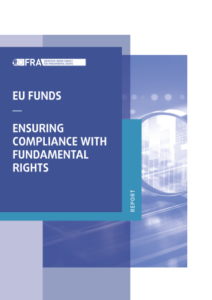
The report deals with the eight EU funds covered by the Common Provisions Regulation 2021/1060 and the conditions on how the EU money should be spent in a way that respects fundamental rights. In 2021, the rules were strengthened by introducing new conditions related to the EU Charter of Fundamental Rights and the UN Convention on the Rights of Persons with Disabilities. The report looks at how these conditions can be upheld in practice. It also examines the role of national human rights institutions, equality bodies and ombudsperson institutions as well as civil society organisations in the context of EU funds, their implementation and monitoring.
Protecting civil society — Update 2023 (October 2023)
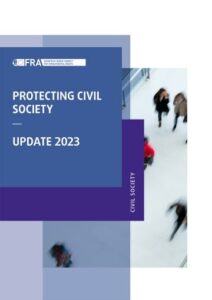
FRA’s sixth annual update on civic space explores the challenges for civil society organisations (CSOs) across the EU. While there has been significant development since FRA began monitoring the situation in 2018, CSOs in the EU are still facing excessive legal and administrative restrictions, insufficient resources, and are often not properly involved in policy and decision-making. Threats and attacks against civil society persist. Some policy areas, such as migration, LGBTIQ+ and women’s rights, have become more hostile. At the same time, there is increasing awareness among policy makers in the EU and the Member States about the situation and the need to address it. For example, legal changes have led to improvements such as greater freedom of assembly or less bureaucracy for civil society, and donors have started to adjust their funds to support capacity building and advocacy.
The Russian aggression against Ukraine: children fleeing Ukraine finding protection in the EU (September 2023)
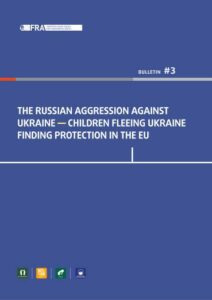
This is the third bulletin in the series of FRA publications addressing fundamental rights implications in the EU following Russia’s invasion of Ukraine. It focuses on displaced children who now find themselves in EU Member States. In June 2023, their number was 1.3 million. The report identifies steps some countries have taken to protect the fundamental rights of children fleeing Ukraine. It also highlights areas of concern such as keeping track of children, access to education and mental healthcare, as well as the situation of children evacuated from Ukrainian institutions.
Promoting migrant integration: strengthening EU law on long-term residence (September 2023)
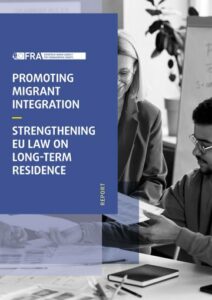
The EU’s long-term resident status gives non-EU nationals access to several rights, which support their integration and inclusion into the host societies. However, the long-term resident status granting these rights is underused. FRA calls on the EU and national authorities to improve the uptake of the EU long-term status and to simplify and ease the requirements. The research report is based on background studies in the 25 EU Member States (including Finland) bound by the Long-Term Residence Directive as well as interviews conducted with experts and long-term residents in 10 EU Member States (namely, Belgium, Czechia, France, Germany, Greece, Italy, Poland, Portugal, Spain and Sweden).
Fundamental rights of older persons: ensuring access to public services in digital societies (September 2023)
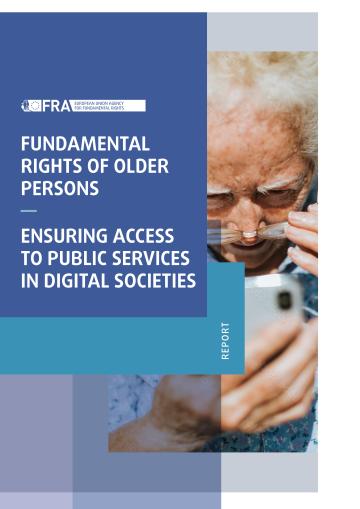
While online public services can make it easier to get social benefits or find information, older people sometimes lack the necessary digital skills to use them. This is a potential barrier to their fundamental rights and can lead to disadvantages and digital exclusion. EU countries need to ensure access to public services for everyone. Older people should be able to choose how they access public services and receive support to learn digital skills.
Fundamental Rights Report 2023 (June 2023)
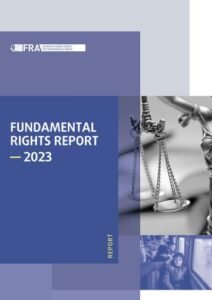
The Fundamental Rights Report 2023 reviews the main developments and challenges of human rights protection in the EU Member States in 2022. Its focus chapter covers the fundamental rights implications of the conflict in Ukraine for the European Union. The report suggests how EU countries can better ensure effective protection for persons fleeing the war. This concerns especially women who need targeted support, such as suitable housing, access to childcare and safeguard against exploitation and sexual violence. Other key fundamental rights issues in 2022 addressed by the report include child poverty, hate crime and hate speech, and safeguarding fundamental rights as the use of digital services and AI increases.
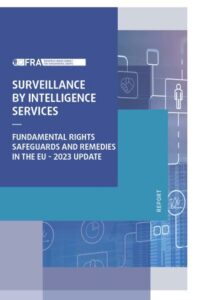
The report provides a partial update on the findings of a FRA report with the same theme, published in 2017. The developments in intelligence laws in the EU since 2017 are viewed in the light of minimum requirements shaped by the Court of Justice of the European Union and the European Court of Human Rights.
Europe’s civil society: still under pressure (July 2022)
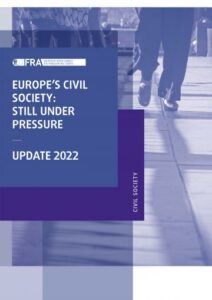
Civil society plays a crucial role in upholding people’s rights and fostering a rule of law culture. Despite positive developments, civil society continues to face numerous challenges ranging from harassment to restrictive laws. EU and its Member States need to do more to ensure a working environment that allows civil society to safeguard human rights across the EU.
The report updates the findings FRA presented in 2021 and 2018 on civil society challenges. It also includes an initial overview of civil society’s response to the war in Ukraine.
Fundamental Rights Report 2022 (June 2022)
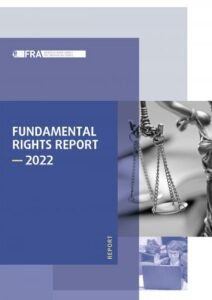
The Fundamental Rights Report 2022 reflects on the main developments and shortfalls of human rights protection in the EU Member States in 2021. Its focus chapter reviews the impact of the COVID-19 pandemic on people’s social rights, such as education, employment and healthcare. It also looks at how EU countries plan to use the EU funding made available through the Recovery and Resilience Facility to counter the social impact of the pandemic. As suggested in the report, governments should involve national human rights or equality bodies in monitoring that the EU-funded recovery measures are not incompatible with fundamental rights.
In 2021, the main challenges of human rights protection concerned child rights, racism and respect for fundamental rights at EU land borders. The COVID-19 pandemic continued to take a toll on children’s well-being and education. Particularly those from disadvantaged backgrounds faced a greater risk of poverty and exclusion. The pandemic fuelled discrimination, hate crime and hate speech towards migrants and ethnic minorities. Migrants faced violence or were turned away at EU land borders. Following the report’s recommendations, EU countries should increase their efforts to promote and protect the rights of all children. They should carry out effective and independent border monitoring to counter rights abuses. Their efforts to tackle racism and ethnic discrimination could be strengthened by penalising hate crime and providing better protection for victims, among other measures.
Guardianship systems for unaccompanied children in the European Union: developments since 2014 (February 2022)
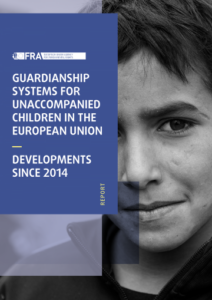
The report examines key developments since 2014 as regards guardianship systems for unaccompanied children from non-EU countries. It looks at unaccompanied children independently of their status, which includes child victims of trafficking, children seeking asylum, and children with international protection status, as well as children who do not apply for asylum but who need protection. The study outlines the situation in all 27 EU Member States and in North Macedonia and Serbia. The information presented reflects the situation in March 2021.
The report reveals that EU Member States continue to face many challenges to provide for full and effective guardianship for unaccompanied children arriving in Europe. National guardianship systems vary greatly across the EU. The support, and the type of protection offered, depends in practice on the child’s status. To address the challenges and to improve the diverse guardianship systems EU countries should, as a priority, protect all children equally and provide guardians for unaccompanied children, as part of overall national child protection schemes, no matter their status. In order to safeguard the child’s well-being and best interests, guardians should be ensured participation in all decisions affecting the child. For guardians to perform their tasks effectively, they should be provided with systematic training and on-going support.
Protecting civic space in the EU (September 2021)
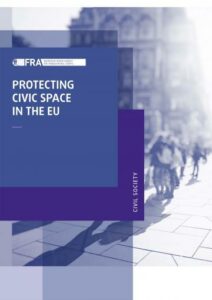
Civil society organisations play a vital role in promoting fundamental rights across the European Union. But they also face diverse challenges, such as threats, smear campaigns, funding cuts and disproportionate restrictions on their right to freedom of association, assembly and expression. In 2020, the COVID-19 pandemic has worsened their working conditions. The situation varies considerably across EU Member States. There are also positive developments, including authorities publicly acknowledging the importance of civil society work, fully involving civil society in policy development or reducing bureaucracy for NGO registration.
The report is based on research, and on two online consultations with civil society organisations, carried out in 2020. It builds on FRA’s 2018 report on Challenges facing civil society working on human rights in the EU.
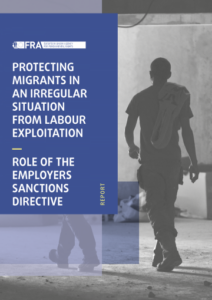
The Employers Sanctions Directive (2009/52/EC) was primarily enacted to dissuade employers from recruiting migrants in an irregular situation, but it also contains provisions to protect workers. It facilitates access to justice for exploited workers and sets out workers’ rights to claim back payment of outstanding wages. The directive also contains provisions to enhance the effectiveness of labour inspections. This report describes how the 25 Member States bound by the directive have been implementing its protective provisions, focusing on the impact these provisions have on migrant workers in an irregular situation who are victims of exploitation and other labour law violations.
The report finds that gaps remain in the enforcement of the protective provisions. Workers do not know their rights or how to complain, and even when they do, they may not receive compensation due. EU countries should do better to protect migrant workers’ rights under existing EU rules. Complaint systems should be improved, for example by enabling trade unions and NGOs to act in support of or on behalf of irregular migrant workers. Labour inspectorates should focus on protecting workers and not enforcing immigration law. This would encourage victims of rights violations to come forward, without fear of being detained and returned. EU countries should guarantee that all irregular migrant workers recover outstanding wages, through access to state compensation or freezing and confiscating employers’ assets. Countries should also issue temporary residence permits to victims of severe labour exploitation.
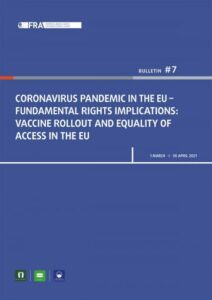
FRA’s Coronavirus Bulletin No. 7 focuses on equitable access to vaccines. It outlines the situation in the EU Member States from 1 March to 30 April 2021. Vaccination campaigns are beginning to bring results in the struggle to tackle the Covid-19 pandemic. However, the bulletin also identifies gaps in vaccine strategies and rollout. The focus on older people, those with medical conditions and key workers sometimes overlooked other at-risk groups. Allegations of ‘queue jumping’ in some Member States undermine trust in the fairness of national vaccine strategies. People in vulnerable situations, such as prisoners, homeless people, and migrants, risk to be left behind in the deployment of Covid-19 vaccination. Countries rarely provide accessible information on vaccine strategies and deployment for people with disabilities or in different languages for those who do not speak the national language well, such as migrants or ethnic minorities. FRA calls on EU countries to ensure fair and equal access to vaccines for all.
Fundamental Rights Report 2021 (June 2021)
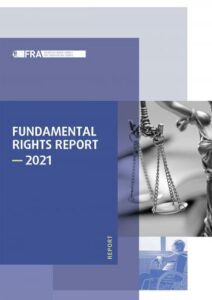
The Fundamental Rights Report 2021 reflects on the main developments and shortfalls of human rights protection in the EU Member States in 2020. The particular topics covered are: the EU Charter of Fundamental Rights and its use by Member States; equality and non-discrimination; racism and related intolerance; Roma inclusion and equality; asylum, borders and migration; information society, privacy and data protection; child rights; access to justice; and implementation of the United Nations Convention on the Rights of Persons with Disabilities. Some of the key challenges identified in the report concern child rights, racism and fundamental rights at borders. A focus chapter explores the impact of the COVID-19 pandemic on fundamental rights and particularly on vulnerable groups.
Coronavirus pandemic in the EU – fundamental rights implications: focus on social rights (November 2020)
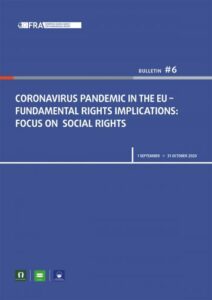
The report outlines some of the measures EU Member States have put in place to protect public health as Europe faces the ‘second wave’ of the Coronavirus pandemic. It highlights how these may affect fundamental rights, especially social rights, including the right to health, education, work and housing. The report covers the period 1 September – 31 October 2020.
During the reporting period many Member States reintroduced or extended states of emergency as the health situation deteriorated. Restrictions on freedom of assembly increased, and many Member States also restricted movement within their national borders. The pandemic continued to have a huge impact on the economies and labour markets of the Member States, resulting in rising levels of unemployment, especially among young people and women. The tourism, hospitality, arts and entertainment sectors were particularly affected in several countries. After the summer break, schools started again with in-person teaching, but due to rising infection rates many reinstated distance learning, posing challenges to the right to education and non-discrimination. The impact of visiting bans on residents’ wellbeing remained a grave concern for people living in institutions. Migrants, asylum seekers and refugees, often living in overcrowded accommodation with poor hygiene conditions, continued to face increased risk of infection and barriers to accessing health services.
Business and human rights — access to remedy (October 2020)
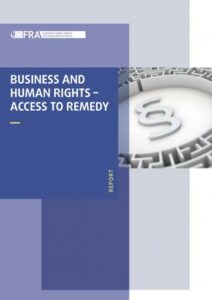
Business activity affects not just customers, employees, and contractors along supply chains, but often entire communities and the environment. This makes it vital that every business complies with human rights. Holding big business responsible for its human rights violations is difficult and many victims never get justice. This comparative report identifies practical, procedural and financial barriers the victims face when they seek redress for business-related human rights abuses. For the report, FRA interviewed business and human rights experts and practitioners in Finland, France, Germany, Italy, the Netherlands, Poland, Sweden and the United Kingdom in 2019 and 2020.
Country study on Finland
Case study report – Finland
Coronavirus pandemic in the EU – fundamental rights implications (July 2020)
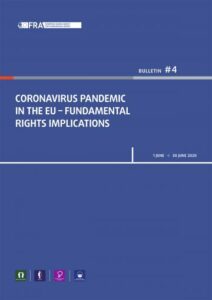
The fourth FRA Bulletin on how the Coronavirus pandemic affects fundamental rights in EU Member States covers measures in place in June 2020. During the reporting period, many governments continued to lift states of emergency, but imposed other crisis measures instead. This prompted concerns about the legal basis for such measures and on-going limitations on fundamental rights. While many restrictions on the daily life of people were gradually relaxed, constraints such as physical distancing measures remain in place. The report surveys the impact of the containment measures on public life, education, work and travel and on vulnerable groups such as people in institutional settings, older persons, persons with disabilities, Roma and Travellers, detainees, and victims of domestic violence. In its closing chapter, the report provides updated information on some of the specific fundamental rights issues addressed in previous Bulletins, namely racism and xenophobia; asylum and migration; disinformation; and data protection and privacy.
Coronavirus pandemic in the EU – fundamental rights implications: with a focus on older people (June 2020)
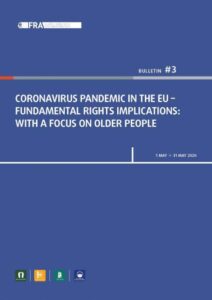
This third FRA Bulletin on the impact of the Coronavirus pandemic across the EU Member States outlines some of the measures that the states have adopted to ease the restrictions imposed at the start of the pandemic while continuing to mitigate the spread of the virus. It covers measures in place in May 2020. The report looks at declarations of states of emergency, including how and under what circumstances Member States began to lift them. It considers the impact of the pandemic and containment measures on the daily life of people and on particular vulnerable groups, such as persons with disabilities, detainees, homeless people and victims of domestic violence. As a specific question, the report focuses on the rights of older people, looking into issues such as access to treatment and testing, the situation in institutional settings, access to services and the impact of isolation. While certain measures were important to reduce the risk to health and life of older people by preventing infection, they raised questions about potential discrimination on the grounds of age. As our societies reopen, governments should take care of the needs of older people as the passage to the ‘new normal’ will likely be slower and more difficult for them.

The report reviews the fundamental rights aspects of emergency measures the EU Member States have taken to manage the Coronavirus (COVID-19) pandemic and the impact of such measures on the daily life of people and on particular vulnerable groups. As a specific question, it looks into governments’ use of technology to help monitor and track the spread of the virus and highlights rights-respectful approaches to such use of technology.
This is the second FRA report in a series of four monthly reports on the impact of the Coronavirus disease across the 27 EU Member States. It covers measures in place from 21 March until 30 April 2020.
Coronavirus pandemic in the EU: fundamental rights implications (April 2020)

The report Coronavirus pandemic in the EU: fundamental rights implications looks at the measures EU Member States use to address the pandemic to highlight rights-respectful approaches that other Member States can learn from. It focuses on four issues underlining the need to carefully and regularly assess the impact on people’s fundamental rights as governments react to the ever-developing pandemic. These issues are: 1) impact on daily life; 2) impact on particular vulnerable groups; 3) discrimination and racism; and 4) disinformation and data protection. The report shows that government measures to combat COVID-19 have profound implications for everybody’s fundamental rights, including the right to life and to health.
This is the first in a series of four monthly reports on the impact of the Coronavirus disease (COVID-19) across the 27 EU Member States. It looks at the impact of government measures in place in February and March on people’s fundamental rights.

